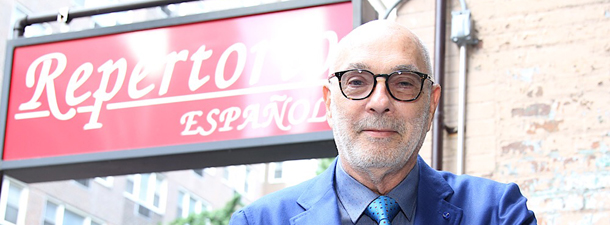
 Based on Gabriel García Márquez’s famed novel “El Coronel no tiene quien le escriba/No one writes to the Colonel,” Harlem Stage will soon conduct two free performances of the story which covers a few months in the life of a colonel whose pension, delayed 15 years by an overwhelming bureaucracy, becomes an obsession. Reduced to poverty despite his veteran status, the protagonist and his wife live in anticipation of his pay. But every Friday the only apparent contact with the outside world comes and goes with the same declaration from the postmaster, “Nothing for the colonel. No one writes to the colonel.”
Based on Gabriel García Márquez’s famed novel “El Coronel no tiene quien le escriba/No one writes to the Colonel,” Harlem Stage will soon conduct two free performances of the story which covers a few months in the life of a colonel whose pension, delayed 15 years by an overwhelming bureaucracy, becomes an obsession. Reduced to poverty despite his veteran status, the protagonist and his wife live in anticipation of his pay. But every Friday the only apparent contact with the outside world comes and goes with the same declaration from the postmaster, “Nothing for the colonel. No one writes to the colonel.”
Born in Manhattan, Robert Weber Federico earned a Bachelor’s Degree in Art History at Columbia College and an MFA in Design for the Theatre at New York University’s School of the Arts. Since graduating, Mr. Federico has continuously worked in theatre, dance and opera beginning in 1967 at companies in Florida (Showboat Theater), New Mexico (The Santa Fe Opera), Rhode Island (Theater-By-The-Sea), Pennsylvania (Pittsburgh Playhouse), New York State (Capital Rep), Maryland (The Peabody Institute), California (The Old Globe), Washington, DC (Folger Shakespeare) and Massachusetts (Stage West).
In 1971, Mr. Federico designed his first production at Repertorio Español and joined the company full-time in 1972, when the Company relocated to the Gramercy Arts Theatre. Since then, he has created sets, lighting and costumes for over 100 classic, contemporary and musical productions for the theatre as well as designing lights for the Flamenco luminary, Pilar Rioja.
During his tenure with the Company, he has overseen Repertorio’s development including marketing, outreach, strategic planning and fundraising. He is most proud of bringing theatre to over 800,000 students in the course of his tenure spearheading the Company’s outreach efforts to schools. In 2005, Repertorio’s Board of Directors appointed Mr. Federico as the Executive Producer.
 Mr. Federico is very satisfied to have incorporated contemporary and commissioned plays of relevance to the Latino community into the Company’s repertory; to have instituted an arts-in-edproject that goes into New York public schools with high Latino/immigrant enrolment to introduce theatre arts and careers; and to have undertaken a program to give young Latinx directors their first chance to direct professionally at Repertorio. For his efforts on behalf of promoting Hispanic theatre in Spanish in the United States, Mr. Federico was awarded Spain’s Orden Al Mérito Civil in 2017.
Mr. Federico is very satisfied to have incorporated contemporary and commissioned plays of relevance to the Latino community into the Company’s repertory; to have instituted an arts-in-edproject that goes into New York public schools with high Latino/immigrant enrolment to introduce theatre arts and careers; and to have undertaken a program to give young Latinx directors their first chance to direct professionally at Repertorio. For his efforts on behalf of promoting Hispanic theatre in Spanish in the United States, Mr. Federico was awarded Spain’s Orden Al Mérito Civil in 2017.
Today, as Repertorio marks its 50th Anniversary, Robert Federico, in conjunction with an enlightened and dedicated Board of Directors, leads the Company continuing and honorin gthe legacy set by Founding Producer Gilberto Zaldívar (1934-2009) and Artistic Director René Buch while contributing to Repertorio’s position as the leading Spanish-language theatre in the nation.
He recently discussed these achievements and more via an exclusive interview.
Meagan Meehan (MM): How did you get into theater and how did you start working on this play?
 Robert Weber Federico (RWF): I grew up in Hell’s Kitchen with Broadway as my front yard. This project was suggested by the adaptor/director Jorge Alí Triana. He had previously done two other adaptations of novels by Gabriel García Márquez.
Robert Weber Federico (RWF): I grew up in Hell’s Kitchen with Broadway as my front yard. This project was suggested by the adaptor/director Jorge Alí Triana. He had previously done two other adaptations of novels by Gabriel García Márquez.
MM: What is it about the plot that makes it compelling?
RWF: Despite it being about living in misery and suffering loss, the old couple can still have hope for the future.
MM: How did you get this staged?
RWF: I hired the best talent, scheduled rehearsals and voila!
MM: How tough is it to sell a play in NY that is only in Spanish?

RWF: Easy to the Spanish-speaking or Spanish-learning audiences. Difficult to New Yorkers who have an aversion to being multilingual and/or to foreign theatre and stories. NYC is both sophisticated and provincial simultaneously.
MM: What’s your favorite scene and why?
RWF: I enjoy the whole play because of its take on the human condition.
MM: What other projects are you going to work on in 2019?
RWF: The first Spanish novel/play, “La Celestina,” is one of the oldest classic plays from Spain that also is the most contemporary.
* * * * *
The show is performed in Spanish with English supertitles on screen. It runs 1 hour and 30 minutes with no intermission on Friday, March 22, at 1pm and 7:30pm. To learn more, see here.

